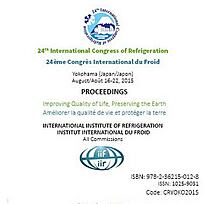
Document IIF
L'impact de la navigation à vitesse réduite sur les exportations de produits réfrigérés de la Nouvelle-Zélande.
The impact of slow steaming on refrigerated exports from New Zealand.
Numéro : pap. n. 153
Auteurs : CARSON J. K., KEMP R. M., EAST A. R., et al.
Résumé
The practice of slow steaming has had a significant impact on New Zealand export industries with increased transit times in some cases causing significant reductions in shelf life once the product has reached the retail stage. The longer transit times also impose the extra cost to exporters of having more inventory tied up in transit. While there is clear evidence to suggest slow steaming has reduced fuel consumption and hence fuel emissions and fuel costs, these savings have not been passed on by the liners to their customers. However, there is no indication that slow-steaming has caused a significant reduction in export earnings for New Zealand (at least up to the middle of 2014). A predicted move to super-slow steaming would put extra strain on the New Zealand meat industry especially, with their lucrative European chilled lamb market under particular threat.
Documents disponibles
Format PDF
Pages : 8 p.
Disponible
Prix public
20 €
Prix membre*
Gratuit
* meilleur tarif applicable selon le type d'adhésion (voir le détail des avantages des adhésions individuelles et collectives)
Détails
- Titre original : The impact of slow steaming on refrigerated exports from New Zealand.
- Identifiant de la fiche : 30015286
- Langues : Anglais
- Sujet : Environnement
- Source : Proceedings of the 24th IIR International Congress of Refrigeration: Yokohama, Japan, August 16-22, 2015.
- Date d'édition : 16/08/2015
- DOI : http://dx.doi.org/10.18462/iir.icr.2015.0153
Liens
Voir d'autres communications du même compte rendu (657)
Voir le compte rendu de la conférence
Indexation
-
Temperature and airflow characteristics in reef...
- Auteurs : BILLING D. P., HAYES A. J., MCDONALD B.
- Date : 20/08/1995
- Langues : Anglais
- Source : For a Better Quality of Life. 19th International Congress of Refrigeration.
- Formats : PDF
Voir la fiche
-
A new concept to determine the optimal conditio...
- Auteurs : WATANABE M., SUZUKI T.
- Date : 21/08/2007
- Langues : Anglais
- Source : ICR 2007. Refrigeration Creates the Future. Proceedings of the 22nd IIR International Congress of Refrigeration.
- Formats : PDF
Voir la fiche
-
Performance of refrigerated ships carrying New ...
- Auteurs : BILLING D. P., HAYES A. J., MCDONALD B.
- Date : 15/11/1993
- Langues : Anglais
- Source : Cold Chain Refrigeration Equipment by Design.
- Formats : PDF
Voir la fiche
-
Partial load test protocol, a way to move ahead...
- Auteurs : STUMPF A., CHAKIACHVILI B.
- Date : 23/06/2014
- Langues : Anglais
- Source : 3rd IIR International Conference on Sustainability and the Cold Chain. Proceedings: London, UK, June 23-25, 2014
- Formats : PDF
Voir la fiche
-
Modelling and prediction of refrigerated trucks...
- Auteurs : MARCY M., FERTEL C., PETIT J. M., SCUTURICI M., CAVALIER G., BONJOUR J.
- Date : 11/06/2024
- Langues : Anglais
- Source : 8th IIR International Conference on Sustainability and the Cold Chain. Proceedings: June 9-11 2024
- Formats : PDF
Voir la fiche
